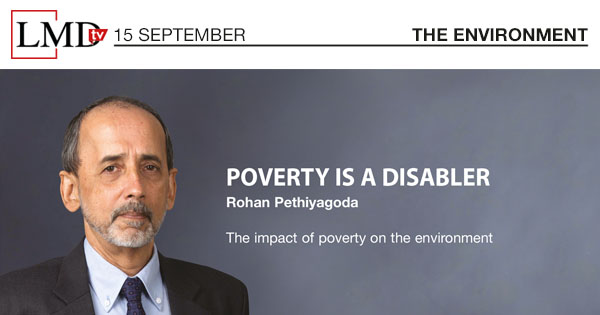LMD TV

“Developed countries have higher environmental standards than their underdeveloped counterparts, implying that economic development sets a positive pathway to enact environmental best practices,” said Rohan Pethiyagoda, the renowned naturalist and taxonomist.
The most notable harm to the environment stems from poverty. He remarked: “Financial impairment puts people at a disadvantage, making it much more difficult for these particular socioeconomic groups to be as environmentally compliant as their peers.”
Environmental compliance requires money and poverty is a significant disabler in society. When people reach a certain threshold of affluence, they’re able to divert more attention to the environment.
He noted: “The realities of developing nations are much different from those of developed countries and this must be considered when devising environmental management plans,” adding that “nevertheless, complying with environmental standards is essential and environmental activism is fundamental for society as a whole.”
For example, if not for the activism by the likes of Vidya Jyothi Prof. Sarath Kotagama and Prof. Thilo Hoffmann in the 1970s leading the charge against the destruction of the Sinharaja and Kotagala copper forests, they would’ve disappeared by now. But half a century later, activism has taken a diametrical form where it is poorly informed.
“This is perhaps why scientists no longer associate themselves with activism since they find it distasteful,” he observed.
“Consequently, activism has become quite misplaced and hysterical where people tend to object to every development project – be it a power plant, a hydroelectric project or an irrigation system,” he said, adding: “This attitude is detrimental since the government then stops listening.”
Meanwhile, Sri Lanka’s plan to become the first country to produce 100 percent organic agriculture poses several issues. Organic agriculture generates yields that are 30 percent lower than the conventional form.
A shift to organic agriculture would result in a financial loss unless a premium price can be charged to cover the shortfall. In addition, farmers need to obtain an organic certified label. Sri Lanka has a million rice farmers and about 400,000 tea smallholders.
Pethiyagoda asserted: “Assuming that a global market demand exists for the 300 million kilogrammes of organic tea Sri Lanka intends to produce annually (which is doubtful), then all these smallholders need to seek certification by paying US$ 300 a year (circa Rs. 60,000) to one of the seven MNC NGOs that operate in Sri Lanka.”
So affordability remains a question.
“Can these farmers – who live at the edge of poverty – manage to pay almost two months of their income to be certified?” he asked, noting that “they’re not the best educated to understand the 85 pages of small print to comply with the SLS standard – i.e. SLS 1324.”
Meanwhile, Pethiyagoda acknowledged that “Sri Lanka has come a long way from the past with more environmentally conscious citizens at present,” adding: “Transferring technical scientific knowledge to the Sinhala medium in the 1990s acted as a catalyst for breeding a remarkable new environmental awareness among the people.”
Youth participation in environmental activism is commendable but Sri Lanka has a shortage of funds to support these programmes. According to him, the ideal solution is to generate revenue from related avenues and divert these funds to the causes.
Furthermore, he asserted: “Many environmental movements are based on ideologies rather than science.” Take for example, organic food and nuclear energy, which is one of the cleanest and sustainable energy providers but garners opposition on the grounds of safety whereas it’s safer than coal in terms of annual deaths.
He concluded his thoughts with the view that “environmental management requires a shift from regulation and policing to something that comes directly from the people.”



